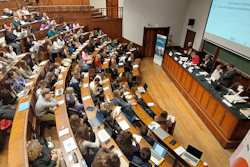Which values do the Una Europa universities share?
With Una Europa we build on the common values that have shaped our past to build a University of the Future. I believe the key values that we share are openness, exchange and intercultural dialogue.
Una Europa universities have been educating for almost 1,000 years. University of Bologna is Europe’s first established university and my university, KU Leuven, is celebrating its 600th birthday in 2025. Together, we represent large comprehensive universities, with diverse disciplines and long traditions. Our universities have shaped Europe through the Renaissance and the Enlightenment. Mobility of academics was, of course, different at that time, but already crucial for progress of science.
From North to South, from East to West; we have very different cultural backgrounds, but share the same European values. We are committed to making our educational offer open and inclusive to large student groups, offering international education for all. We are co-developing a value-driven research culture, which prioritizes at the same time excellence, openness and diversity. Our Team Science approach – bringing together inter-university and interdisciplinary consortia – provides us with the necessary framework to help solve fundamental problems, as well as major societal challenges. We are also very much committed to the principle of sustainability; we see ourselves as an institution that systematically develops communities, spaces and projects to meet global environmental and societal challenges, of today and the future.
How will these values be translated into an offer for students?
We have the ambition to jointly pilot more than 20 new international courses and programmes for students who are looking to study within a European University alliance. This will cover two joint Bachelor degrees in European Studies and Sustainability, but also a joint Doctoral degree in Cultural Heritage. We also plan a MOOC in the Ethics of Artificial Intelligence, which we will offer for all Bachelor students to give them a technical background to this important technological innovation within the context of European society.
We will be focusing much more on challenge-based learning opportunities also, creating international student teams to work on real-life problems defined by our external partners. An excellent example of this is our recent Una.Ten competition, our pan-European student hackathon to tackle challenges in COVID19 post-emergency times. The competition attracted more than 100 students who worked together in 19 virtual teams and with local partners. One example of an excellent outcome was the students from University of Edinburgh. They worked together with a local art gallery to develop measures for safe museum visits. Thanks to Una.Ten, the team has also been in touch with the Mayor of Helsinki to potentially scale up the idea. This is really “openness, exchange and intercultural dialogue” in practice!
What do these values mean for the day-to-day work of Una Europa?
To be honest – Joining forces is at the same time an opportunity and a challenge. We are talking about two sides of the same coin. It’s our diversity and our exchange across borders of whatever kind – be it languages, cultures, disciplines – that makes our offer innovative. But I won’t deny that reaching results can be time consuming at times, precisely because of our different backgrounds, cultures, languages. This being said, I think the following proverb sums it up quite nicely: “If you want to go fast, go alone. If you want to go far, go together.”



